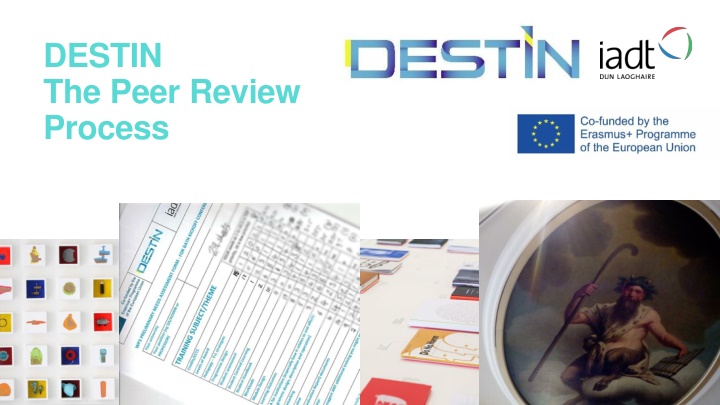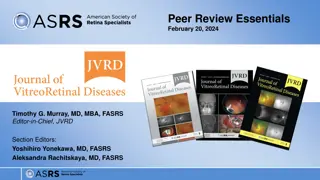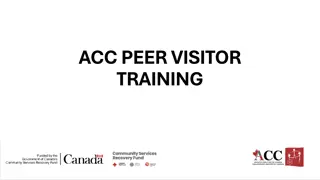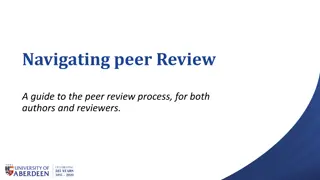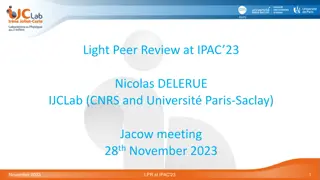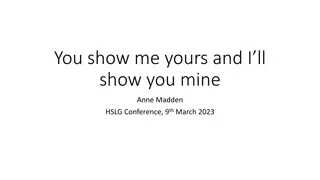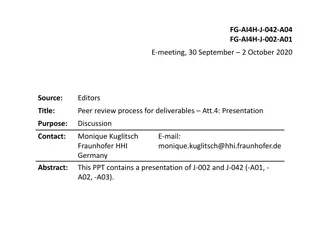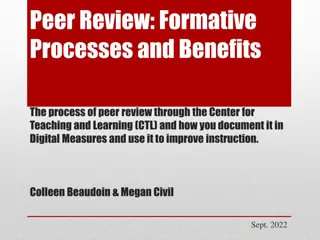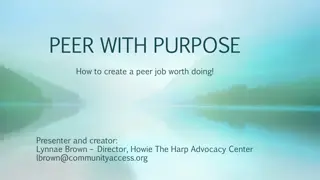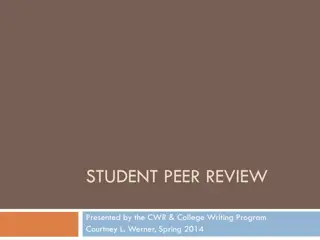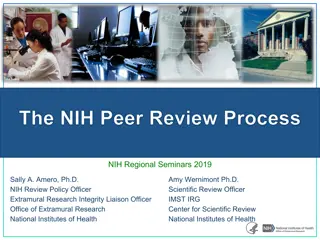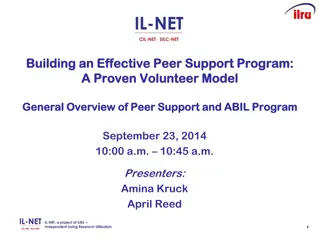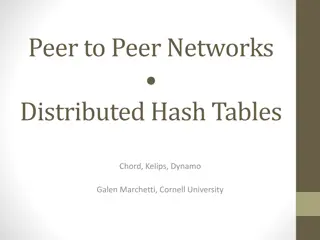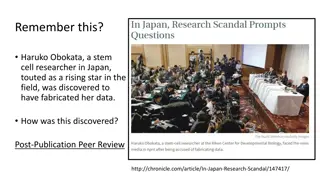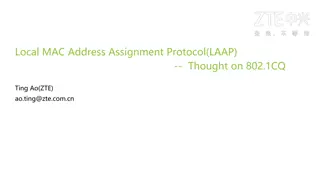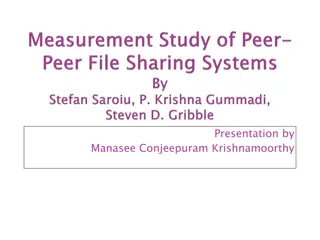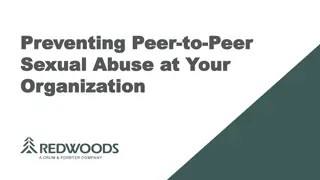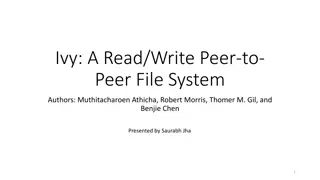The Peer Review Process Unveiled - Guidelines and Insights
Delve into the intricate world of peer review with this comprehensive guide. Understand the significance of peer evaluation in scholarly publishing and gain valuable insights into the process. Explore key elements such as reviewer selection, feedback integration, and publication ethics. Enhance your knowledge of the peer review process, empowering you to engage confidently in academic discourse and contribute meaningfully to scientific advancements.
Download Presentation

Please find below an Image/Link to download the presentation.
The content on the website is provided AS IS for your information and personal use only. It may not be sold, licensed, or shared on other websites without obtaining consent from the author.If you encounter any issues during the download, it is possible that the publisher has removed the file from their server.
You are allowed to download the files provided on this website for personal or commercial use, subject to the condition that they are used lawfully. All files are the property of their respective owners.
The content on the website is provided AS IS for your information and personal use only. It may not be sold, licensed, or shared on other websites without obtaining consent from the author.
E N D
Presentation Transcript
DESTIN The Peer Review Process
How will the peer reviews work? Work to be done before peer review? David Quin, Programme Co-Chair, Lecturer, Department of Film and Media, National Film School, IADT
Three DESTIN peer review panels in March 2020... Our DESTIN Application document says that we will form three peer-review panels that will study the documentation provided by each CDT, conduct site visits to each Ukrainian university, and produce a report on the findings. Although we should expect each panel to be quite formal in the way that it operates (as if it were an official validating/course-approval panel), it is important to remember that the purpose of the panel is developmental (to give advice about what has been achieved and what enhancements can be made) rather than judgemental.
Three Panels... Panel 1 to be responsible for 4 peer reviews (IFNUL, UCU, UzhNU, CHNU) DQ to Chair. Panel 2 to undertake 3 peer reviews (MSU, ZNU, SSU) Niko to Chair. Panel 3 to undertake 3 peer reviews (TSNUK, BKNUC, MEHU) BSU to Chair (possibly Mark)?
Peer Review Panels... IADT is unique. Ireland s only institute of art, design and technology Focus on creative, cultural and technological sectors Campus is alive with ideas, innovation and entrepreneurial activity Students work with fantastic staff, many of whom are internationally acclaimed Home to the National Film School Fresh, modern campus with lively friendly atmosphere
Composition of the panels... 5 external members (3 from EU partners, 1 from UAS, and 1 from HR). 4 internal (host university) members (i.e., 2 members of staff, one student/recent graduate, one local employer representative). Student. The student member of the panel could be nominated by the CDT or the university s Students Union or equivalent. Current student or recent graduate. Employer. Chosen by the CDT, already involved in the work of the Journalism/Media programmes; someone who knows and cares about the employability of Journalism/Media graduates.
One-day site visits... Arrival. Private Meeting of the Panel. (1 hour) Meeting with some members of the CDT at the host university; max. 4 people. (1 hour) Review of the Design of the two New/Revised Programmes; max. 6 people, 3 persons from each programme. (2 hours)
One-day site visits... Review of the Curriculum of the two New/Revised Programmes; max. 6 people, 3 persons from each programme. (2 hours) Meeting with Students/Alumni from the New/Revised Programmes; max. 8 people. (1 hour) Private Meeting of the Panel. (1 hour) Outline Feedback to the CDT team. (1 hour)
UKR Agency criteria...
10 Criteria... Criterion 1. The design and objectives of the study programme. Criterion 2. The structure and content of the study programme. Criterion 3. Access to the study programme and learning outcomes recognition. Criterion 4. Teaching and learning under the study programme. Criterion 5. Control measures, evaluation of students and academic integrity.
Criteria continued Criterion 6. Human resources. Criterion 7. Educational environment and material resources. Criterion 8. Internal quality assurance of the study programme. Criterion 9. Transparency and publicity. Criterion 10. Study through research. Note. Criterion 10 is applied during accreditation of study programmes of the third cycle of higher education.
Grading scale... Level F the study programme and/or educational activities under such programme do not meet the defined criterion, and identified shortcomings are of a fundamental nature and/or cannot be eliminated within a one-year period; Level E the study programme and/or educational activities under such programme do not meet the defined criterion in general, but identified shortcomings can be eliminated within a one-year period;
Grading scale... Level B the study programme and/or the educational activity under such programme meet the defined criterion in general, with possible shortcomings that are deemed minor; Level A the study programme and/or the educational activity under such programme fully meet the defined criterion and are of an innovative/exemplary character.
Peer Review Panels... IADT is unique. Ireland s only institute of art, design and technology Focus on creative, cultural and technological sectors Campus is alive with ideas, innovation and entrepreneurial activity Students work with fantastic staff, many of whom are internationally acclaimed Home to the National Film School Fresh, modern campus with lively friendly atmosphere
Documentation Required... PART 1: TWO NEW/REVISED PROGRAMME DESCRIPTORS (BA AND MA) 1.1 A Brief Description of the Programme ; (maximum 2 pages.) 1.2 A statement of the Aims/Goals of the Programme : (max 2 pages) 1.3 An outline of the Structure of the Programme ; (2 pages or a diagram) 1.4 A matrix showing the Alignment of Learning Outcomes with Programme Aims . (max. 2 pages)
Documentation Required... 1.5 The Module Descriptors . (guide is 1 page per module) 1.6 Summary Description of Programme- level Quality Assurance Procedures - the key processes for monitoring, evaluating, and enhancing the study programme and the quality of students learning opportunities, experiences and outcomes in the future (max. 3 pages) SED (including SWOT)
SED The SED should contain information and reflection about both of the academic programmes. Self Evaluation Document... 2.1 National, Institutional and Professional Contexts (max. 3 pages) 2.2 Development of the Academic Programmes (max. 3 pages) 2.3 Key Changes (max. 4 pages) a) an account of the main changes that have been made to the design and delivery of the programmes in the light of the DESTIN project; (2 pages per programme)
SED 2.4 Information about Students (max. 3 pages) a) quantitative data on the two academic programmes: Self Evaluation Document... e.g., current student numbers, demographic data (ethnicity, gender, disability, age), entry standards, enrolments, course/study choices, progression rates, mobility, academic performance, post-award employment, international students. b) qualitative data, in the form of short statements that continued would help panel members to understand how the design and content of the two academic programmes have been revised to provide learning opportunities, experiences and outcomes (employability)that address the nature and variety of future students needs and aspirations.
Peer Review Panels... IADT is unique. Ireland s only institute of art, design and technology Focus on creative, cultural and technological sectors All info on the website Campus is alive with ideas, innovation and entrepreneurial activity Students work with fantastic staff, many of whom are internationally acclaimed Home to the National Film School Fresh, modern campus with lively friendly atmosphere
Possible DRAFT DESTIN KYIV Training for Trainers and TFT Toolkit training 09:00 to 11:00 - Peer Review Process How it works. Why are we doing this? 11:30 to 13:00 - The university SWOTs and SERs 14:00 to 15:30 How to use TOOLs in the TFT TOOLKIT! Ronan s Study Programme Document 16:00 to 17:30 day one Aligning with Qualifications Frameworks and National Standards EQF, NFQ and educational standards WHY? HOW?
Possible DRAFT DESTIN KYIV Training for Trainers and TFT Toolkit training 09:00 to 11:00 - A MOCK peer review panel one university presents itself for review in front of the whole group (we did this on ALIGN and it worked well!) 11:30 to 13:00 feedback from the MOCK peer review panel (and group discussion) 14:00 to 15:30 - Back to your university s SWOT and SER what changes do you think you now NEED to make? 16:00 to 17:30 day two What next sequencing updated Action Plans HOW to start writing What help you ll need from mentors etc
Possible DRAFT DESTIN KYIV Training for Trainers and TFT Toolkit training DQ meets with each university partners on their PLAN? Maybe based on the peer review groupings (meet with each university individually 30 minutes each) Question Do you need BASIC TFT on SCL, assessment and feedback, project work, blended learning, learning outcomes? day three If SO, we change the programme of the Kyiv training.
end. questions? David.Quin@iadt.ie iadt.ie @myIADT myIADT
